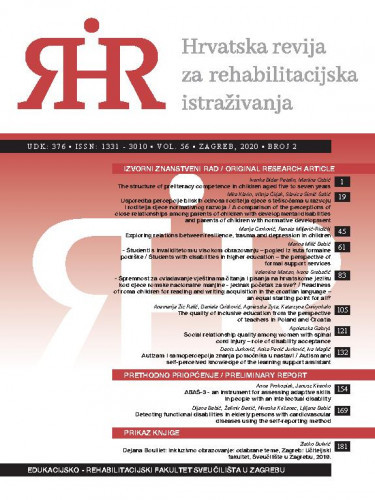Visoko obrazovanje važan je segment pripreme za tržište rada svih studenata koji upisujući pojedini fakultet žele steći potrebnu edukaciju za rad u odabranom području. Zemlje Europske Unije, pa tako i Hrvatska, ulažu u razvoj visokog obrazovanja kroz različite operativne programe koji pridonose dostupnosti obrazovanja za sve kategorije građana. Otvorenost visokog obrazovanja svakom članu društva temelj je inkluzivne obrazovne politike Europske Unije. Obrazovne politike postaju područje interesa cijele europske zajednice jer se društvo znanja vidi kao temelj gospodarske konkurentnosti Europe na globalnom tržištu. Cilj je rada ispitati kako stručnjaci koji rade u službama podrške za studente s invaliditetom doživljavaju poštovanje prava na visoko obrazovanje studenata s invaliditetom na Sveučilištu u Zagrebu. Riječ je o kvalitativnom istraživanju provedenom u 2019. godini putem polustrukturiranih intervjua, dok su podaci obrađeni primjenom tematske analize. U istraživanju je sudjelovalo 10 stručnjaka koji rade u službama podrške za studente s invaliditetom na Sveučilištu u Zagrebu. Rezultati ukazuju na pozitivne primjere poštovanja prava na visoko obrazovanje, ali identificiraju i postojeće slabe točke koje je potrebno unaprijediti u skladu sa suvremenim postavkama inkluzivnog europskog društva. Promjene u budućnosti potrebne su u područjima standardizacije asistencije i prijevoza, prilagodbe infrastrukture, redovite edukacije nastavnog osoblja, senzibilizacije studenata te u razvoju ljudskih resursa u uredima za studente s invaliditetom.; Higher education plays a pivotal role in preparing students for the labour market by providing education at the university level required for work in the chosen field. The EU member states, including Croatia, invest in higher education through different operational programmes to increase access to education for all citizens. Equal access to higher education for all is at the core of EU education policies for inclusion. Moreover, the education policy importance rises on the European agenda as the concept of knowledge society becomes central to European competitiveness on the global market. This paper aimed to examine how professionals employed by support services for students with disabilities perceive the respect of the right to higher education for students with disabilities at the University of Zagreb. The paper is based on qualitative research from 2019, which involved semi-structured interviews and thematic analysis of data. The research included 10 professionals employed by the support services for students with disabilities at the University of Zagreb. Although the results indicated certain good practice examples of respecting the right to higher education, they also pointed out the challenges that ought to be addressed in line with contemporary inclusive practices in Europe. In the future, improvements are recommended in the following areas: standardising assistance and transportation, adapting infrastructure, continuing training of the teaching staff, raising student awareness and human resource development at the Office for Students with Disabilities.
Sažetak

 Hrvatska revija za rehabilitacijska istraživanja : 56, 2(2020) / urednica, editor Jelena Kuvač Kraljević
Hrvatska revija za rehabilitacijska istraživanja : 56, 2(2020) / urednica, editor Jelena Kuvač Kraljević